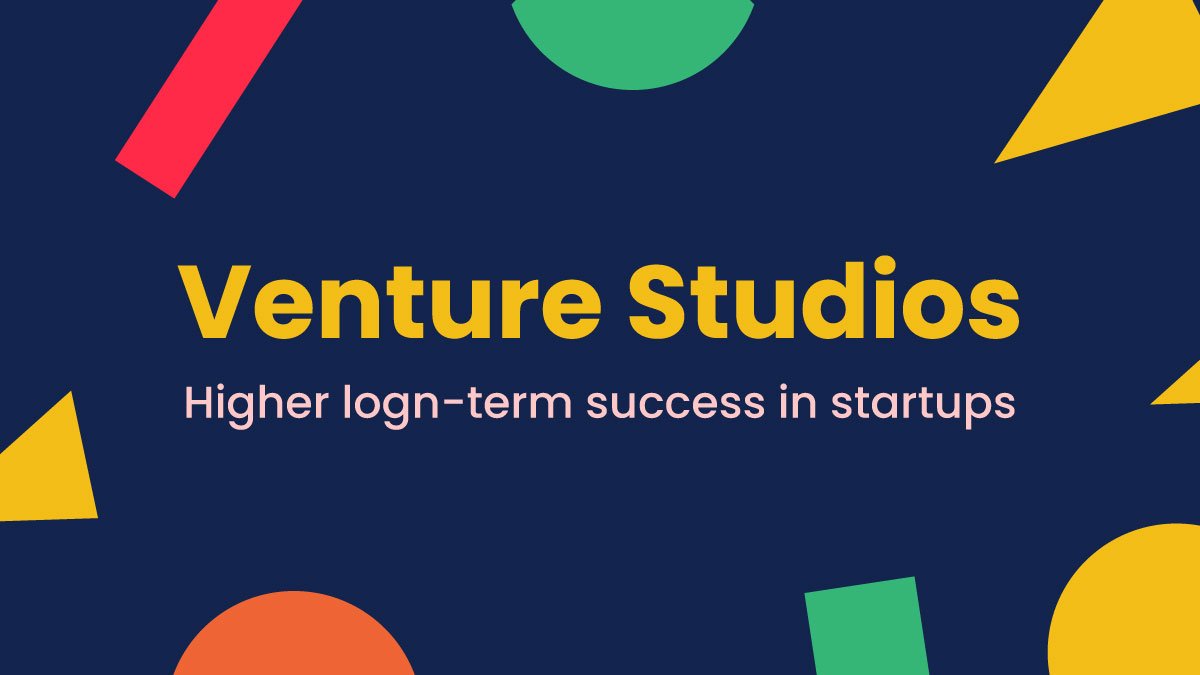
Intro post:
Let’s take a look at some of the numbers. According to a 2022 report by Global Startup Studio Network (GSSN):
- Venture Studio startups have a 30% higher success rate than traditional startups.
- 84% of startups coming out of studios go on to raise a seed round.
- 72% of those ventures make it to series A (compared to 42% of traditional ventures).
- The time from zero to series A is 25.2 months for venture studio startups, compared to 56 months for conventional startups.
- The average internal rate of return (IRR) for startup ventures is 53% compared to 21.3% for traditional startups.
You might ask, Why don’t I know any Venture Studio Startups?
Actually, Venture studios have been the birthplace of many successful startups. You might have used their products/services as well. You don’t know they are from Venture Studios. Let’s look at some successful Venture Studio Startups first:
- Moderna: Known for its mRNA technology and COVID-19 vaccine, Moderna emerged from Flagship Pioneering1.
- Dollar Shave Club: Acquired by Unilever for $1 billion, this subscription-based razor company was incubated by Science Inc2.
- Snowflake: A cloud-based data warehousing company with a highly successful IPO, Snowflake was supported by Sutter Hill Ventures2.
- Twilio: A cloud communications platform that went public in 2016, Twilio was developed by The Foundry Group.
- Bitly: Known for its URL shortening service, Bitly was created by Betaworks1.
- Aircall: A cloud-based call center software company, Aircall was incubated by eFounders.
- Hims & Hers: A telehealth company offering personal care products, Hims & Hers was co-founded by Atomic.
So, why do venture studios have higher success rates?
Venture studios offer a unique approach to entrepreneurship that can address many of the shortcomings associated with the traditional venture capital model. Here are some ways venture studios can mitigate these issues:
Long-Term Focus: Venture studios are deeply involved in creating and developing startups from the ground up. This involvement often includes a long-term commitment to the venture’s success, which contrasts with the short-term exit focus of traditional VCs. This long-term focus can help startups build sustainable and resilient businesses by providing ongoing support and resources, reassuring you that your startup is in it for the long haul.
Reduced Risk of Failure: Venture studios typically have a higher success rate than traditional startups because they provide comprehensive support, including access to experienced entrepreneurs, operational resources, and strategic guidance. This reduces the risk of failure and increases the likelihood of success, giving you confidence and security about your startup’s future.
Diversity and Inclusion: Venture studios can actively work to promote diversity and inclusion by intentionally recruiting a diverse range of founders and teams3. By providing equitable access to resources and support, venture studios can help level the playing field for underrepresented groups in the startup ecosystem.
Efficient Resource Allocation: Venture studios often share resources across multiple ventures, achieving economies of scale. This can include fractional support for marketing, HR, finance, and legal services. Efficient resource allocation ensures that each startup receives the support it needs without unnecessary duplication of efforts.
Balanced Growth and Market Stability: By focusing on building solid and sustainable businesses, venture studios can help prevent market distortions caused by inflated valuations and unsustainable practices. Their hands-on approach ensures that startups grow at a manageable pace, reducing the risk of bubbles and market instability.
Supportive Exit Strategies: Venture studios are more flexible with exit strategies, often aligning them with the startup’s long-term goals rather than pushing for quick exits2. This alignment helps ensure that exits benefit both the startup and the investors, supporting the business’s long-term health.
Venture studios offer a promising alternative to traditional venture capital by addressing many of its inherent challenges. Their comprehensive support, focus on sustainability, and commitment to diversity make them well-suited to foster the next generation of impactful startups.






